- Home
- Michael Newton
Blaze! Hatchet Men
Blaze! Hatchet Men Read online
BLAZE!
HATCHET MEN
MICHAEL NEWTON
Blaze! Hatchet Men by Michael Newton
Text Copyright 2015 by Michael Newton
Series Concept and Characters Copyright 2015 by Stephen Mertz
A Rough Edges Press Book
Cover Design by Livia Reasoner
www.roughedgespress.com
All rights reserved.
This is a work of fiction. The characters, incidents, and dialogues are products of the author's imagination and are not to be construed as real.
No part of this book may be used or reproduced in any manner whatsoever without written permission of the publisher, except in the case of brief quotations embodied in critical articles and reviews.
Chapter 1
J.D. Blaze was half-past tipsy, moving on toward three sheets to the wind.
Why not? It wasn't every day he had a honeymoon, particularly five years after marrying the great love of his life. Some people might have said he'd put it off too long, but J.D. wasn't most people.
And neither, thankfully, was Kate.
His bride—could he still call her that, when they had been together half a decade?—was distracted at the moment, raking in another jackpot at a poker table near the bar where J.D. stood, watching her play. It wasn't just a game to Kate, a self-taught master of the railroad bible who could quote the odds on any hand from memory. She played to win and rarely left a table without some profit to show for it.
Tonight, so far, was no exception.
They had chosen San Francisco for their honeymoon because it was convenient, after wrapping up a relatively quick and peaceful job commissioned by Wells Fargo. A peculiar bandit had been stopping coaches on the road between Frisco and Sacramento, stealing bullion shipments from the northern California gold fields. As a one-man operation he was rare enough, but this bandido also serenaded his victims while he was at it, turning the holdups into a literal road show. J.D. and Kate had followed the regular coaches for two weeks and finally caught him at it, a result achieved—for once—without a shot fired in anger. Now, the bandit, one Chuco Cárdenas, was cooling his heels in jail and looking forward to some twenty years in San Quentin Prison.
Unless he could charm the court with a song.
Since they were in the neighborhood, flush with Wells Fargo reward money, where better to try that long delayed nuptial retreat than in San Francisco—and more specifically, on that bayside city's infamous Barbary Coast?
Established during the Gold Rush of 1849, the red-light district sprawled over nine blocks of waterfront, starting near Portsmouth Square and continuing east to the first shipping docks at Buena Vista Cove. Born specifically to fleece the thousands who came west to strike it rich, or who'd already proved that them thar hills were rich in gold, the district featured gambling dens, saloons and brothels, dance halls, concert halls, variety shows, and tattoo parlors for the sailors passing through. Some of them only passed one way, as they were "Shanghaied"—drugged and carried aboard ships departing overnight for ports in the Far East. They woke at sea, confronted with a choice: work off their passage, or jump overboard and swim for home, wherever that might be.
If visitors desired a little something different from what the Coast provided normally, around the clock, they merely had to walk next-door, where San Francisco's Chinatown held out the lures of opium and women who were rumored—falsely, as J.D. had once discovered—to be "different down there." If travelers survived a night in Chinatown, which some did not, the laundries opened bright and early, seven days a week, to clean their soiled attire.
J.D., sipping his fifth whisky and looking forward to his seventh beer, gave little thought to his surroundings—none at all to Chinatown—while watching Kate play cards. She was a natural, adept at most games, but a genius with the several kinds of poker favored in saloons from Kansas City to the California coast. Better, she had a knack for charming rubes, treating them to her smile and her apparent full attention, leaving most convinced that losing two or three weeks' pay to her was worth it, for the pleasure of her company.
Most of the rubes, not all.
Tonight, one of the other players at Kate's table was a short but stocky man, well in his cups and losing steadily to Kate, no matter who was dealing any given hand. Of course, being what California's Mexican inhabitants referred to as a macho man, puffed up on pride of gender that proved nothing but the plumbing he was born with, he had focused on the only woman at the table—and the prettiest on hand tonight in Beauregard's Emporium—as his appointed nemesis. Over the course of eight or nine bad hands, liquor and arrogance had told him that no woman could defeat him unless she was cheating.
"Hey, now," said the boozy gambler, as Kate hauled in another pot. "How many's that?"
"How many what?" she answered back.
"Straight hands you won. I know we're near the ocean, but I'm smellin' somethin' fishy here and now."
"You need some coffee, friend," Kate said. "The alky fumes are backing up on you."
"Ain't drunk," the gambler said. "Ain't blind, neither."
J.D. wondered if he might be a miner, with those gnarled and callused hands—and whether he was any good with the Smith & Wesson Model 3 revolver tucked under his belt, around in back. It was an awkward carry for a fast draw, worse if you were drunk, but sometimes even awkward drunks got lucky in a fight.
"So, tell me," Kate was saying, holding up her deal. "Tell all of us. What is it you imagine that you saw?"
"Can't put a finger on it," said the maybe miner, "but I know damn well straight cards don't run that way for nobody."
"You think they're marked?" Kate asked him. "Do you want another deck?"
"Nothin' from you. Maybe a house deck."
"By all means," Kate said. "Go on and fetch one. We'll be pleased to wait for you."
Instead of getting up, the drunk said, "And there's hideout cards, to boot."
"Cards in my boot?" Kate mocked him, not so gently. "Which one would that be?"
"Hid out somewhere," the red-faced man insisted, stubbornly.
Kate pushed the deck across to him. "Check it," she said. "Show us which cards are missing."
Scowling at the cards in front of him, he said, "Could be outa another deck."
"Now, that's insulting," Kate replied. "You think I'm dumb enough to play a hideout card when one of you all may be holding the same thing?"
The drunk was thinking now. Planted on the bar, ten feet to his right, J.D. imagined he could smell a whiff of something burning, underneath the gambler's sunburned scalp. He watched the player rise up from his chair, lean forward with his left hand splayed against the tabletop, his right trembling a little as it reached toward Kate.
"Mebbe we oughta see what's hidin' in that blouse a yours," he slurred.
"Maybe you ought to pull that hand back," Kate advised him, "while it's still attached to you."
"The hell's that s'pose to mean?"
Before Kate could reply, someone burst through the bat-wing doors of Beauregard's Emporium, distracting gamblers, drinkers, painted ladies—and J.D. himself. Dramatic entrances were normal for saloons, but this one slammed the swinging doors against the wall on either side.
And left a startled looking Chinaman at center stage.
That was unusual, as J.D. knew from his short stay in San Francisco. The Barbary Coast might abut Chinatown, but the Chinese—"celestials" to some, who claimed they'd dropped in from another planet—absolutely never gambled, drank, or otherwise amused themselves in white establishments. They had their own bars, gambling halls, and other forms of entertainment readily available to whites with cash in pocket, but that stream of commerce didn't flow two ways. When Chinese visited the C
oast, as dishwashers and janitors, they entered through backdoors and didn't mingle with the clientele.
Silence descended in the barroom, as the joint's piano player glanced around and froze, fingers suspended in midair above his keyboard. The Chinaman seemed equally surprised to find himself surrounded by white faces, many of them hostile, but instead of rushing out the way he'd come in, he dodged to his right, past the piano player, and ducked out of sight behind his upright instrument.
Now, even Kate's annoying adversary was distracted, staring off across the room and blurting out, "The hell? Is that a Chinee hidin' over there?"
That started conversation rippling through the room, some of the patrons frowning darkly as they muttered over booze. J.D. had seen this kind of thing before, played out with colored men and Indians who inadvertently offended whites by turning up where they were not invited or desired. Sometimes it led to killing of an ugly and outrageous kind.
He reached down casually, still leaning on the bar, and loosed the hammer thong that held his Colt .45 securely in its cross-draw holster. Kate's eyes met his, she gave a little nod, then turned back toward the action brewing on the far side of the room.
That nod. What did it mean, exactly?
J.D. guessed that she was ready to pitch in, if the disturbance turned into a lynching party, but he wasn't absolutely sure. The best thing, he decided, was to keep an eye on Kate and back whatever play she made. He wasn't keen on getting shot up for a total stranger, much less one who came from halfway round the world, but if his wife stepped in, J.D. was bound to follow her.
It never went that far.
Some half a dozen of the bar's white patrons were in motion toward the corner where the Chinaman had gone to ground, when five more of his countrymen barged through the swinging doors. Three of the new arrivals held revolvers. One was armed with something J.D. thought might be an ancient blunderbuss. The last man through the door was brandishing some kind of cleaver that resembled a short sword.
All five were dressed alike, loose-fitting shirts and trousers, all in black, with round caps of the same color atop their heads and shoes resembling slippers on their feet. Each had a braided pigtail—what the Chinese called a queue—dangling behind. Instead of looking comical, they all seemed deadly serious.
One of the front men, packing a revolver, told the room at large, "We seek Huo Xiang of the Kwong Duck," he said. "Surrender him, and no one need be harmed."
That sent another rumble through the barroom, maybe half the patrons reaching to their hips or underneath their coats for holstered weapons. Seeing that he'd lit a fuse, the leader of the Chinese raiding party raised his pistol, fired a shot into the crowd, and his companions armed with six-guns followed suit.
J.D. was moving toward Kate's poker table in a crouch, intent on keeping her from harm if that were possible, before the blunderbuss went off. Its blast rattled the ceiling chandeliers, while buckshot or scrap metal blew a tunnel through the crowd of customers and working girls, blood pooling on the floorboards where they fell. Curses and screams mixed with the gunfire, going both ways now, and J.D. wondered if the Chinaman who'd brought a cleaver to a gunfight was regretting his decision.
In the midst of chaos, he found Kate. She'd dumped her chair and scuttled to another nearby poker table, flipping it for cover, while her winnings lay behind her and the drunk who claimed he'd caught her cheating was about to help himself. J.D. reared up and cracked him on the noggin with his pistol's barrel, putting him away for the short term.
As for the money on the table, Kate meant more to him than all the gold in California's fabled hills.
He reached her side and found her with her own Colt drawn, but still unfired. The gunfight wasn't theirs, and J.D. frankly didn't care who won, as long as he and Kate came out of it alive, with all the body parts they'd brought to Beauregard's Emporium.
"You see the Chinaman?" she asked.
"Which one?"
"The first one through the door. What did the other say his name was?"
"Sing Song? Hell if I know," J.D. said.
"He's key to this," said Kate.
"None of our business," he reminded her.
"You must be curious."
"I'm really not," he told her, honestly.
Kate risked a peek around the capsized table, plugged him with an elbow, saying, "There he goes!"
And she was right. The Chinaman who'd come in first, distinguished from the others by his cap and clothes of navy blue, was dashing past the bar and toward a staircase leading to the second floor, where working girls earned money on their backs—or in whatever pose a paying customer preferred.
"Come on!" Kate said.
"Babe, why?"
"Because I'm curious."
She took off then, ducking and weaving through a hail of lead, making a beeline for the stairs where Sing Song or whatever was ascending, short legs taking two steps at a time. J.D. cursed and went after her, already certain that it was a bad idea.
Chapter 2
I must be crazy, J.D. thought, as he pursued Kate up the stairs. Behind them, pistol fire was echoing around the barroom, battering eardrums while bullets shattered bottles and the backbar mirror, drilling walls and furniture, some of them mangling flesh and bone. Curses and cries of pain mingled together, some of them reedy voices yelping in a language J.D. didn't understand.
Crazy, he thought again, but kept on after Kate, watching the way she moved inside her tight pants while he ducked incoming slugs. A second detonation from the blunderbuss, followed by screams, told him the Chinaman behind it could reload quickly while under fire.
They reached the second floor of Beauregard's Emporium with nothing worse than splinters from some ricochets. Could have been worse, but J.D. knew they weren't out of the woods just yet. Upstairs, it was bedlam, with the girls and paying customers scrambling around in varied stages of undress, ranging from birthday suits to trousers hanging low. A couple of the younger ladies were in tears, but J.D. saw more fear among their clients, miners and men of substance thrown together in the hallway, sharing a determination to escape the battleground.
And they were far from safe, as demonstrated by a bullet bursting through the floor, a few inches from Kate's left foot, coming to rest somewhere beyond the ceiling panel. That provoked more screams, but Kate and J.D. forged ahead, guns drawn, jostled regardless, as they sought the Chinaman.
For what?
Kate's curiosity, no less.
J.D. believed his wife was well worth dying for, but this was pushing it.
"I see him!" Kate called out, pointing along the hallway to a figure halfway down. The clothes and queue gave him away, no possible confusion with the white men passing by in both directions, many of them carrying their go-to-meeting clothes.
J.D. had no idea if their intended quarry spoke or understood English, but Kate's alert caused him to hesitate, glance back, and raise a hand clutching some kind of pocket pistol, small but deadly at close range. He fired, a sharp crack cutting through the nervous chatter in the corridor, and Kate dropped low, J.D. taking his cue from her.
The bullet struck a man of middle age, pot-bellied, pale where clothes concealed his flesh in daily life. He staggered, spit blood, and was dropping to his knees when J.D. passed him by, chasing the Chinaman and Kate. The runner ducked into a room down range and slammed the door behind him, Kate advancing steadily.
"Hold on now," J.D. cautioned.
"No time," Kate replied. "He's running for it."
So was she, kicking the door their man had left ajar and rushing through as if she thought his pistol only held one cartridge. With a curse, J.D. followed, to find her standing at an open window, flimsy curtains stirring in the breeze.
"Lost him," she said, sounding halfway surprised. "The sneaky little SOB jumped out."
Just then, another storm of gunfire echoed from the barroom down below, then died in seconds flat. A man was shouting, giving orders in an Irish brogue, taking command.
/>
"Maybe we ought to jump," Kate said.
"Too dark down there," J.D. replied. "Let's take the stairs."
* * *
The Irishman who'd taken over Beauregard's Emporium was wearing a policeman's uniform, a captain's brass bars shining from his collar. His seven-pointed star confirmed the rank and had been polished to a satin sheen. Around him, half a dozen other officers in uniform were covering the crowd, standing among the corpses of four Chinamen and twice as many whites.
J.D. saw that the fellow with the cleaver had escaped. Good thinking, after all.
As they arrived, the captain was instructing everyone still on their feet to lay their weapons down. He saw J.D. and Kate descending, turned to face them with his own revolver drawn, and said, "You too. Get down here. Put your pistols on the bar."
They did as they were told and waited while the captain worked his way around the barroom, asking questions, with a bluesuit flunky following and taking notes. It took the better part of forty minutes for the man in charge to reach them, and they spent it making sure they had their stories straight.
Since neither one of them had fired a shot, J.D. thought they should be all right, but who could ever tell? He knew from newspaper reports that Frisco's first police department, organized in 1849, had been corrupt and nearly lawless, described in one editorial as being "largely made up of ex-bandits, and naturally the members are interested above all in saving their old friends from punishment." The same writer had said, "Policemen here are quite as much to be feared as the robbers; if they know you have money, they will be the first to knock you on the head. You pay them well to watch over your house, and they set it on fire."
But things had changed since then, or so the city fathers said. Ordinances passed during the mid-1850s had cleaned up the force, in theory, and reorganized it along military lines, with strict accountability. Its first police chief was a founder of the San Francisco Committee of Vigilance, organized outside the law in 1853, to rid Frisco of thugs and ruffians where the police had failed.

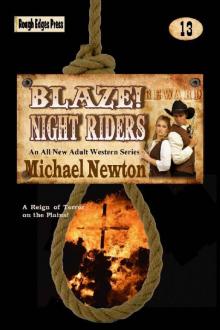 Blaze! Night Riders
Blaze! Night Riders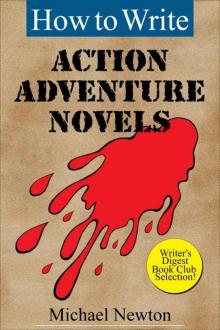 How to Write Action Adventure Novels
How to Write Action Adventure Novels Blaze! Bad Medicine
Blaze! Bad Medicine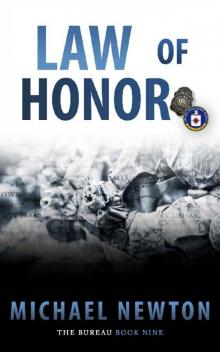 Law of Honor
Law of Honor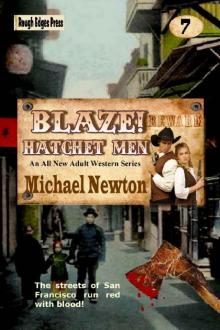 Blaze! Hatchet Men
Blaze! Hatchet Men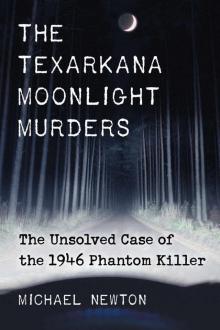 The Texarkana Moonlight Murders
The Texarkana Moonlight Murders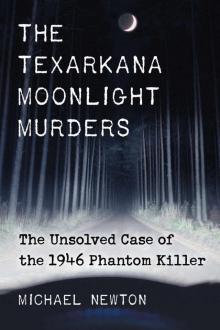 The Texarkana Moonlight Murders: The Unsolved Case of the 1946 Phantom Killer
The Texarkana Moonlight Murders: The Unsolved Case of the 1946 Phantom Killer